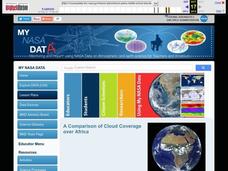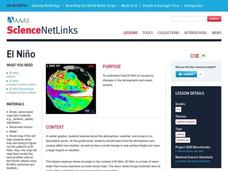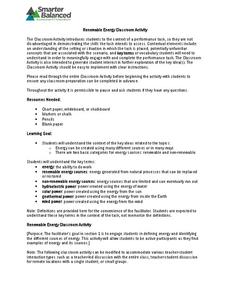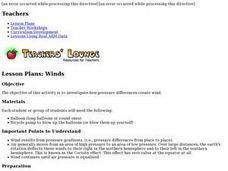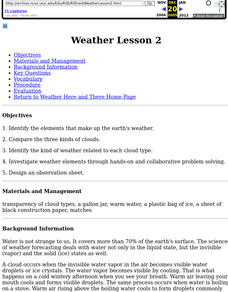Curated OER
A Comparison of Cloud Coverage over Africa
Young scholars identify different climate regions and local weather patterns. For this cloud coverage lesson students use NASA satellite data and import it into Excel.
Curated OER
Worksheet 3: Earth's Climate System II
A diagram of a mountain range and the prevailing winds is shown at the top of the page. Meteorology pupils describe the weather conditions at different points on the diagram. They explain the El Nino effect and why evaporation and...
Curated OER
Weather Tools
How do we know so much about the weather? Young scientists will learn all about the various tools used to detect changes in daily weather patterns. Each slide contains illustrations and detailed descriptions of tools, such as a...
Curated OER
Seas in Motion
Young scholars analyze wave movement. In this Science lesson, students use items that float to observe waves and currents. Young scholars record and discuss their observations.
Curated OER
Warm and Cold Air
Students conduct an experiment to discover what happens to air when it is heated or cooled, discover that wind moves from a high-pressure area (an area of sinking air) to a low pressure area (an area of rising air).
Curated OER
Blowin' in the Wind
Students discover how wind is created on earth: changes in temperatures and air pressure. They list good and bad effects of the wind and make a weather vane and practice using it for 2 weeks.
Curated OER
El Nino
Explore the properties of water and the affects of El Nino. Middle schoolers will learn about the devastation an El Nino can cause as well as the definition of El Nino. Additionally, they will discover the cause of El Nino along with the...
Teach Engineering
Weather Basics
Weather — there's more to it than meets the eye of the storm. With this resource young meteorologists learn about the basics of weather, including information about the factors that influence the weather, common weather vocabulary, and...
Smarter Balanced
Renewable Energy
Renewable and non-renewable energy sources are the focus of a series of activities that prepare learners for a performance task assessment on energy. Groups identify the various sources of energy and classify these sources as either...
Curated OER
An Exploration of Wind Energy and Wind Turbines
How is wind produced and is it a good source for energy production? Get some air moving in your class. Learners take a pre-test, watch a demonstration of how electricity can be generated by wind energy, test different turbine factors for...
Curated OER
The Work of Waves and Wind
This is not revolutionary, but it is informative. Earth science viewers in grades 7-12 get carried away with wave and wind erosion. They view diagrams of how waves impact ocean shorelines. They see examples of the different types of sand...
Curated OER
What Is El Niño?
Students access information at remote sites using telecommunications, identify impacts by reviewing past El Ni??o events, make and use scale drawings, maps, and maps symbols to find locations and describe relationships.
Curated OER
Weather or Not...
Learners observe many different types of weather conditions, they become aware of variations in sunlight, clouds, wind, and forms of moisture. They discover the techniques, brush strokes, and colors that artists such as Charles...
Curated OER
How Wind Works
Second graders investigate the process that creates wind. In this wind lesson, 2nd graders create a wind diagram. Students write an essay to accompany their diagram.
Curated OER
Breezy Windsock
Students discuss the wind-- what causes it, how it is used, and how it affects the weather. They list ways they know that air is moving, such as feeling it on their skin or watching a flag blow in the breeze. Students research the...
Curated OER
The Sky Show
Learners use the internet to gather information to create their own science lesson plan. They choose from optical, wind, or electrical phenomena and use the internet to research information. Finally, they organize the information they...
Curated OER
Weather
Intended for use with the very littlest of learners, this presentation provides the opportunity to identify various types of weather. An image of sun, rain, snow, wind, storm, and clouds are shown directly under their associated word....
Curated OER
Wind and Wildfire
Emerging scientists research weather-related vocabulary terms, and map out where wildfires are most likely to occur. To bring this lesson to life, you could demonstrate what happens to a fire when you cool or remove the fuel, or cut off...
Curated OER
Weather
In this earth science worksheet, middle schoolers use the clues given at the bottom of the sheet to solve the crossword puzzle related to weather. They identify various cloud types and how they are formed. Students also identify...
Curated OER
Weathering and Erosion
In this earth science worksheet, students use the clues given at the bottom of the sheet to help them solve the crossword puzzle on weathering and erosion. They identify the various factors that cause erosion in different places.
Curated OER
Winds
Fifth graders investigate how pressure differences create wind. They discuss the Coriolis effect, then explore what happens when blown-up balloons are released.
Curated OER
Weather Lesson 2
Students identify the elements that make up the earth's weather. Begin by having students pretend they are hiking along a mountain ridge. It's been sunny and warm all day, but you see a dark line of clouds moving from the west.
Curated OER
Forecasting
Students research how to forecast the weather by observing cloud formations and wind patterns. They research modern means of weather forecasting, complete a quiz and an activity page designed to let them try out new forecasting skills...
Curated OER
Summer Breeze
Introduce a lesson on wind with this short poem titled, "Summer Breeze." After reading the poem, ask your class why wind is important for our environment. What a great resource for a lesson hook!


